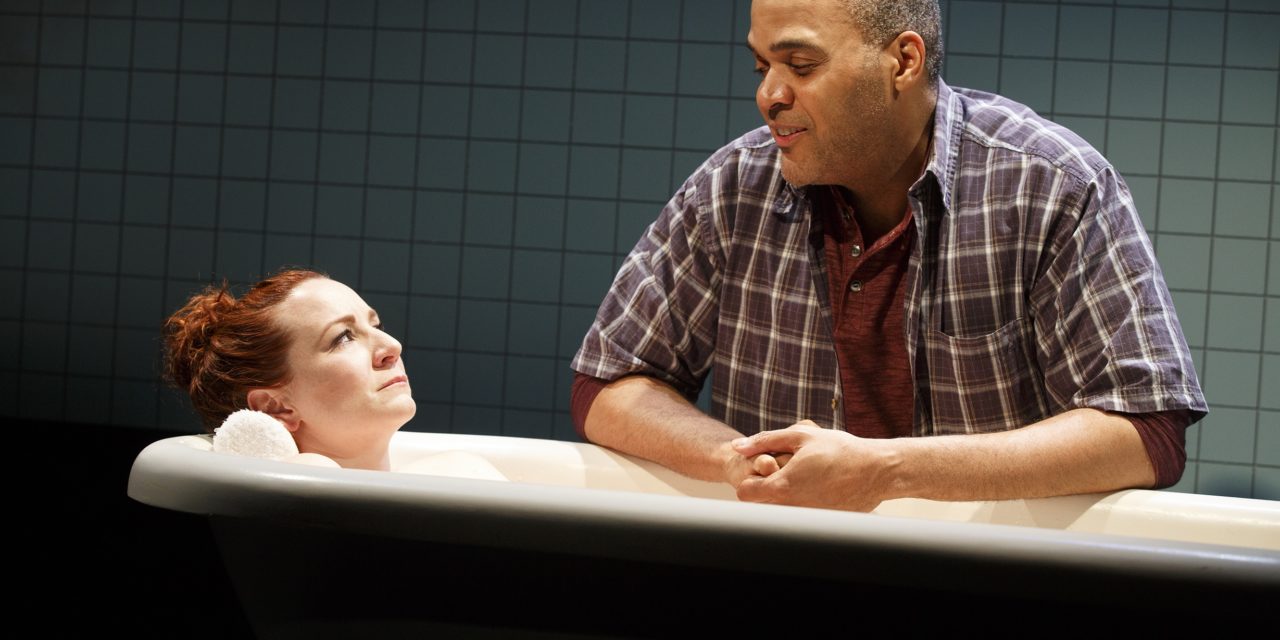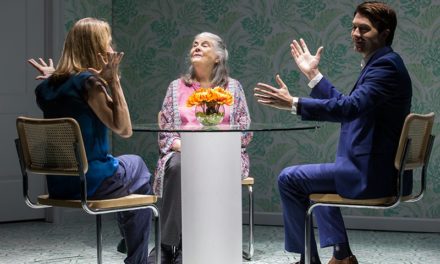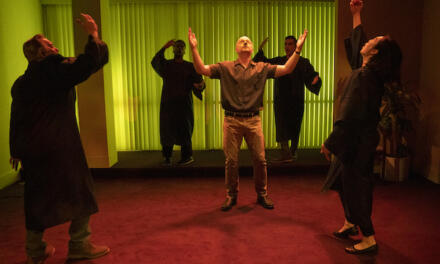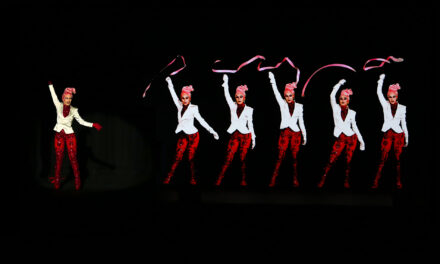Martyna Majok is a young playwright whose new play, Cost of Living, has just opened in a Manhattan Theatre Club production at New York’s City Center. Majok was born in Poland and grew up in Northern New Jersey. A graduate of Yale School of Drama, she has won several awards and fellowships, including the Lanford Wilson Award and the Helen Merrill Emerging Playwrights Award. She is a dynamic and engaging conversationalist, prone to amusing antidotes and in possession of a wry sense of humor. The following are excerpts from our conversation:
Jack Wernick: How do you think your experience being born in another country, in this case, Poland, has shaped your view of life in the US as a playwright?
Martyna Majok: I guess two things come to mind. I became hyper-aware of language as I grew up with my mom and other immigrants in New Jersey. A lot of the parents who came over with their children were learning English at the same time that they were teaching their children to walk and talk. My mother did not learn English in school, she learned English at her job. We spoke Polish at home. In my neighbourhood, you could hear how people talk, over-enunciating words, people who are surrounded by others learning to speak English. I didn’t see theatre until I was 18. I didn’t have a connection with that community. When I did see theatre in college, I remember thinking, “Where are my stories? Where are the stories of people misplaced?” In my plays, there’s usually a character who is misplaced. There is a DNA in my plays of people looking for belonging.
JW: When did you realize you wanted to be a writer?
MM: Where did this kernel come from? Growing up, when we moved here (to the US,) I grew up in a kind of domestic abuse situation. I would keep myself locked in my room, engaged in quiet activities like drawing. When I would get an assignment from school to write a one-page essay, I would show up at school with 25 pages! I would find ways to draw, quiet activities, to process what was going on. In high school, I worked for an adult literacy program. We would write skits to give the students the muscle memory language, little dramatizations of what they would say. Eventually, they (the skits) became more elaborate, such as, what to say if there was a murder at the bank! (laughs) I was writing for the theatre before I knew what that was. When I went to college, I dove into the theatre. I guess that’s what I was doing, how I became a writer, by writing those scenarios in the adult literacy program. That is how I became a writer.
JW: Your plays often deal with characters who are marginalized by society, either via economic or physical circumstances. Do you think these people lack visibility in the stories being told in the US?
MM: Totally, 100%. Originally, when I started seeing theatre, there was some representation. On TV? None at all. When I first started writing these stories, people would respond to them strangely. I had to learn how to write to connect with them. I had to figure out how to make them laugh, with my macabre sense of humor. These stories weren’t visible. I had to learn how to make the audience feel welcome, by holding onto the truth of these circumstances. It’s changing for the better. There’s an active pursuit of stories of diversity. American theatre is reaching out.
JW: You come from a country with a rich theatrical history. Do you think American theatre is by nature less inherently political than that being produced in Europe? In other parts of the world?
MM: I didn’t see theatre in Poland until this past December. I found out about Poland in college! (laughs) Maybe it’s in my DNA! I think it’s economics. Theatre (in Poland) is not expensive. There’s more access to it there than here. Economics limits accessibility here in the US. (People view) theatre as entertainment here, as a distraction, as an escape. After the uprising in Poland, they would transfer political agenda in theatre. You would have to find metaphor and allegory. With capitalism, if you’re writing about the political, you have to put it into the character. Commercial American theatre, if it’s political, has to come from the personal. There is political theatre here but it’s more in the experimental theatre world. In Poland, they’re eager to explore the political.
JW: You have written several plays and a musical. Do you see screenwriting as a genre of writing you’d considering exploring in the future?
MM: Totally, I love it. That was the first access to me, TV. The beauty of the film is that you don’t need language. The purest form (of storytelling) is visual, which makes it democratic. I find myself having to figure out how to make my characters speak English! The accessibility of TV would help me reach a wider audience with my stories. Not every community can afford theatre tickets and can afford to see these stories. With a Netflix account, you can.
JW: Your new play Cost of Living has just opened in New York to positive reviews. Are there any further plans for productions of this play that you’d like to share?
MM: I don’t have any. The play’s about to get published. It will be making the rounds of regional theatres, and also in London. There are people who are coming to see it, I hope!
JW: You have won several awards and have several commissions in the works. Does your approach to writing differ according to whether it’s for a commission and if so, how?
MM: Of the theatres I’ve gotten commissions from, I’ve been to most of them. A lot of it is about space, what form, what’s interesting to me regarding space. I find limitations help my creativity: How can I explode the limitations? You can only write four characters. The biggest challenge is when a theatre says to me, “We have a giant space. You can do whatever you want!” (laughs) F. Scott Fitzgerald said writers have basically the same two stories to tell. Twyla Tharp likes to read an author’s work backwards, from the latest work they wrote to the earliest. She says they’re often writing about the same basic things, with increasing sophistication. I’m constantly orbiting around displacement, writing about women orbiting around their limitations, characters who are displaced.
Cost of Living is playing at New York City Center, 131 West 55th Street, in New York City.
This post was written by the author in their personal capacity.The opinions expressed in this article are the author’s own and do not reflect the view of The Theatre Times, their staff or collaborators.
This post was written by Jack Wernick.
The views expressed here belong to the author and do not necessarily reflect our views and opinions.


















